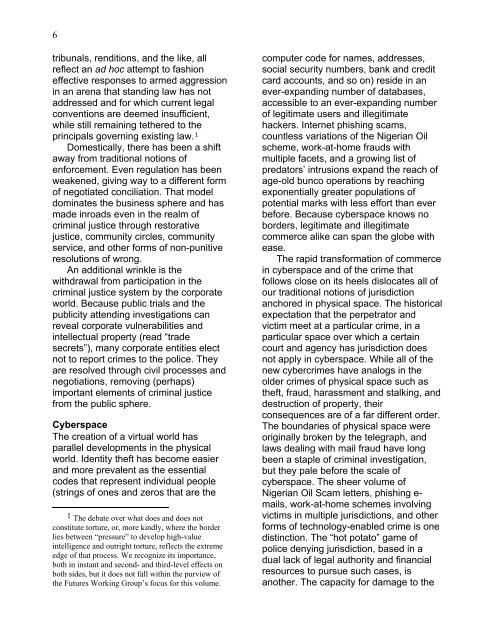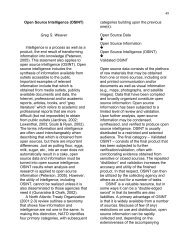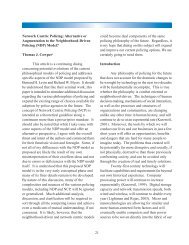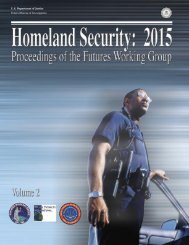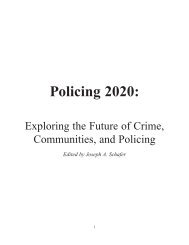Volume 4 FWG - Futures Working Group
Volume 4 FWG - Futures Working Group
Volume 4 FWG - Futures Working Group
You also want an ePaper? Increase the reach of your titles
YUMPU automatically turns print PDFs into web optimized ePapers that Google loves.
6tribunals, renditions, and the like, allreflect an ad hoc attempt to fashioneffective responses to armed aggressionin an arena that standing law has notaddressed and for which current legalconventions are deemed insufficient,while still remaining tethered to theprincipals governing existing law. 1Domestically, there has been a shiftaway from traditional notions ofenforcement. Even regulation has beenweakened, giving way to a different formof negotiated conciliation. That modeldominates the business sphere and hasmade inroads even in the realm ofcriminal justice through restorativejustice, community circles, communityservice, and other forms of non-punitiveresolutions of wrong.An additional wrinkle is thewithdrawal from participation in thecriminal justice system by the corporateworld. Because public trials and thepublicity attending investigations canreveal corporate vulnerabilities andintellectual property (read “tradesecrets”), many corporate entities electnot to report crimes to the police. Theyare resolved through civil processes andnegotiations, removing (perhaps)important elements of criminal justicefrom the public sphere.CyberspaceThe creation of a virtual world hasparallel developments in the physicalworld. Identity theft has become easierand more prevalent as the essentialcodes that represent individual people(strings of ones and zeros that are the1 The debate over what does and does notconstitute torture, or, more kindly, where the borderlies between “pressure” to develop high-valueintelligence and outright torture, reflects the extremeedge of that process. We recognize its importance,both in instant and second- and third-level effects onboth sides, but it does not fall within the purview ofthe <strong>Futures</strong> <strong>Working</strong> <strong>Group</strong>’s focus for this volume.computer code for names, addresses,social security numbers, bank and creditcard accounts, and so on) reside in anever-expanding number of databases,accessible to an ever-expanding numberof legitimate users and illegitimatehackers. Internet phishing scams,countless variations of the Nigerian Oilscheme, work-at-home frauds withmultiple facets, and a growing list ofpredators’ intrusions expand the reach ofage-old bunco operations by reachingexponentially greater populations ofpotential marks with less effort than everbefore. Because cyberspace knows noborders, legitimate and illegitimatecommerce alike can span the globe withease.The rapid transformation of commercein cyberspace and of the crime thatfollows close on its heels dislocates all ofour traditional notions of jurisdictionanchored in physical space. The historicalexpectation that the perpetrator andvictim meet at a particular crime, in aparticular space over which a certaincourt and agency has jurisdiction doesnot apply in cyberspace. While all of thenew cybercrimes have analogs in theolder crimes of physical space such astheft, fraud, harassment and stalking, anddestruction of property, theirconsequences are of a far different order.The boundaries of physical space wereoriginally broken by the telegraph, andlaws dealing with mail fraud have longbeen a staple of criminal investigation,but they pale before the scale ofcyberspace. The sheer volume ofNigerian Oil Scam letters, phishing e-mails, work-at-home schemes involvingvictims in multiple jurisdictions, and otherforms of technology-enabled crime is onedistinction. The “hot potato” game ofpolice denying jurisdiction, based in adual lack of legal authority and financialresources to pursue such cases, isanother. The capacity for damage to the


